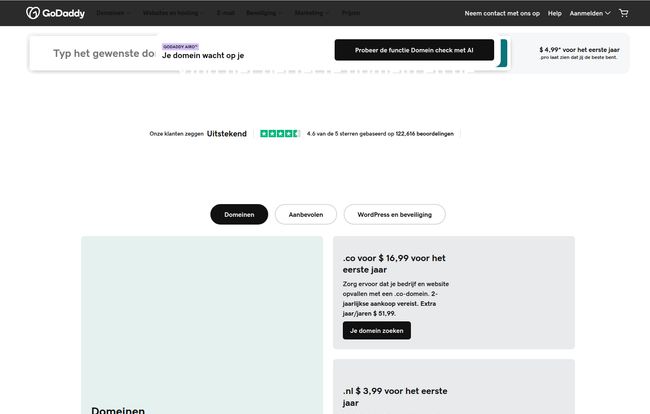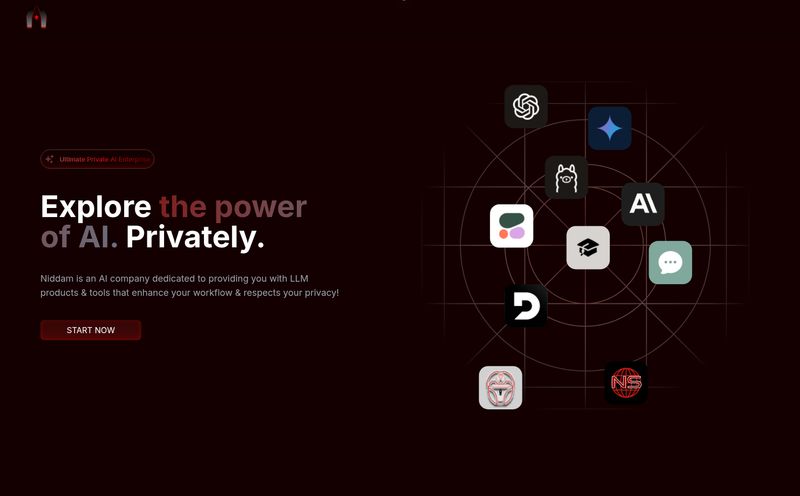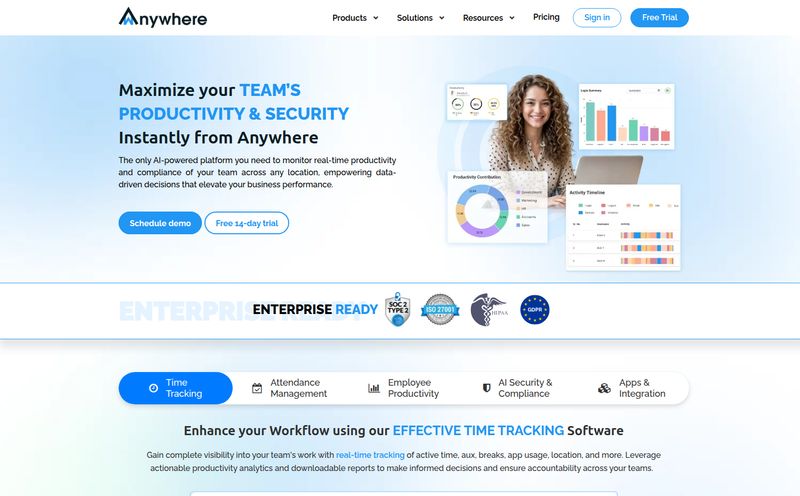How many times have you walked away from a great conversation, only to have the important details leak out of your brain like a faulty sieve? You remember you had a fantastic chat with a potential client, Sarah, but did she say her daughter's name was Emily or Emma? Was her big project launching this month or next? The details get fuzzy, fast.
It's a modern problem. We're overloaded with information, and our poor, analog brains are struggling to keep up. I've tried everything. Scraps of paper, a thousand different note-taking apps, even a dedicated spreadsheet that I updated for exactly one week. It’s a constant battle. So, when I stumbled upon the concept of Better Friend AI, my interest was more than a little piqued. An AI dedicated to helping me remember my conversations? It sounds like sci-fi, but also... kinda brilliant.
What Exactly Is Better Friend AI Supposed to Be?
Think of it as a personal CRM (Customer Relationship Management) tool, but for your entire life, not just your sales leads. It’s designed to be your external memory bank for all the human connections you make. The core idea is simple: instead of letting those golden nuggets of conversation vanish into the ether, you capture them, and an AI helps you make sense of it all. It’s not just about storing data; it’s about building stronger, more meaningful relationships because you can actually remember the little things. And we all know, the little things are the big things.
How It Aims to Work
The whole system is built around a simple, if slightly unusual, habit: recording voice memos. After you have a chat with someone—a friend, a colleague, a new contact—you’d pull out your phone and record a quick voice memo summarizing the conversation. “Just met with David. He’s stressed about the Q3 report but really excited about his upcoming trip to Italy. His dog, Buster, just had surgery but is recovering well.” That’s it. You just do a brain dump.
From there, Better Friend AI’s technology is meant to kick in. It takes your rambling voice note and gets to work.

Visit Better Friend AI
AI-Powered Summaries
First, it transcribes your voice to text. No more trying to type out notes with your thumbs while walking down the street. Then, its AI chews on that transcription and pulls out the key points, creating a neat, tidy summary of your chat. So your jumbled thoughts become a clear record you can refer back to.
Smart Follow-Up Suggestions
This is where it gets interesting. Based on the summary, the tool suggests ways for you to follow up. Using the example above, it might prompt you in a week to: “Ask David how the Q3 report went,” or in a month, “Ask David for pictures from his Italy trip!” It’s like having a hyper-organized personal assistant whose only job is to make you seem more thoughtful. I’ve always felt that remembering to ask about something specific is the most powerful way to show someone you were actually listening.
The Intriguing "Energy Mapping" Feature
This is the feature that really caught my eye. Better Friend AI claims to track how you feel after talking to certain people. By analyzing your voice memos (perhaps the tone or the words you use to describe the interaction), it creates an “energy map.” It helps you identify the people in your life who energize and inspire you versus those who, well, drain you. In a world where we’re all trying to protect our peace and manage burnout, that’s a pretty compelling proposition.
The Upside of an AI Memory
The potential benefits here are obvious. You save a ton of time on manual note-taking. Your memory for names, dates, and details gets a serious boost, which is invaluable for anyone in a client-facing role or, you know, anyone who just wants to be a better friend. Forgetting a key detail can be embarrassing; remembering one can make someone’s day. It could genuinely help you cultivate your professional and personal networks more effectively. It’s productivity applied to people, which feels a bit cold on the surface but makes a lot of sense in practice.
It's like a post-game analysis for your coffee dates. You get to see what was important, what you need to remember, and how it all fits into the bigger picture of that relationship. For someone like me, who juggles dozens of conversations a week for work and pleasure, that’s not just a feature; it’s a lifeline.
Let's Be Real About the Downsides
Of course, it’s not all sunshine and AI-powered rainbows. As I thought more about it, a few red flags popped up.
The Voice Memo Hurdle
First, the entire system hinges on you consistently recording voice memos. Will I really remember to do that after every single important conversation? It feels a little... awkward. Ducking into a corner to whisper into my phone about the person I just left might get some strange looks. It’s a new habit to build, and we all know how easy it is for new habits to fail.
Hello, Is This Thing On? Privacy Concerns
And then there’s the big one: privacy. You're essentially creating a database of your private conversations and personal details about the people you know. You’re feeding this information into an AI system. Where is that data stored? Who has access to it? How secure is it? These are not small questions. The idea of a data breach exposing my private notes about friends and colleagues is, frankly, terrifying. Any company offering a service like this would need to have an iron-clad, transparent privacy policy. I couldn't find one.
Can We Trust the AI?
There's also the reliance on the AI itself. What if its summary is wrong? What if it misunderstands the nuance or sentiment of your voice memo and tags an energizing friend as a draining one? An AI is a tool, not a human. It lacks context, and putting your relationships in the hands of an algorithm that could misinterpret things feels like a gamble.
The Big Question: What's the Price Tag?
From what I could gather, Better Friend AI was planning a pretty standard SaaS pricing model, which is always appreciated for its clarity.
There was a Free tier, which is great for getting a feel for the service. It supposedly included the core voice-to-text transcription and some basic note organization. Basically, a way to see if the voice memo habit sticks without committing any cash. Then there was the PRO plan for $9.99 per month. This unlocked the premium features: the cool energy mapping, the smart follow-up recommendations, and more advanced ways to tag and organize your notes. The price feels about right; it's in line with other premium productivity apps. It’s a cup of fancy coffee or two in exchange for a better memory.
So, Where is Better Friend AI Now? A Digital Ghost Story
Alright, so here's the twist in the story. After getting all hyped about the concept, I went to find the website and sign up. And I hit a brick wall. The domain, `betterfriendai.com`, leads to a GoDaddy parked page. In fact, it looks like a domain broker is offering to sell the domain for a cool $99.99 (plus commission).
What does this mean? Well, it’s not a great sign. It could mean a few things. The project might have run out of funding before it ever truly launched. The founders could have been acquired and the technology absorbed into another company (an “acqui-hire”). Or maybe they just decided to rebrand and pop up under a new name. I did some digging, and I couldn't find a new landing page or any recent chatter about it on social media. It seems, for now, Better Friend AI is a ghost.
It’s a bit of a bummer, honestly. The idea is so solid. It speaks to a problem that so many of us face every single day. It’s a reminder that in the fast-paced world of tech startups, even the best ideas don’t always make it across the finish line.
Alternatives to Fill the Void
Since you can't exactly download Better Friend AI right now, what can you do? Don't despair! The core idea is something you can replicate, albeit with a bit more manual effort.
You could go old school with a dedicated notebook. Or, if you're like me and live in the digital world, you can set up a personal relationship management system in a tool like Notion or even a simple Google Sheet. It takes discipline, but it works.
If you want a dedicated app that does exist, you might look into platforms like Clay or Dex. They are designed as personal CRMs and integrate with your calendar, email, and social media to help you stay on top of your network. They don’t have the voice memo or energy mapping features, but they are powerful tools for anyone serious about relationship management.
Frequently Asked Questions
- What was Better Friend AI?
- Better Friend AI was conceived as an AI-powered assistant to help you remember details from conversations. It used voice memos to create summaries, suggest follow-ups, and even analyze which relationships were most energizing.
- How did the energy mapping feature work?
- The idea was that the AI would analyze your voice memos—likely your tone and word choice—to determine whether your interactions with specific people left you feeling energized or drained, creating a personal “energy map.”
- Was Better Friend AI free?
- It was planned to have two tiers: a free version with basic transcription and organization, and a PRO version for $9.99/month that included advanced features like energy mapping and follow-up suggestions.
- Is Better Friend AI still available?
- It appears not. The official domain is currently parked and for sale on GoDaddy, suggesting the project is no longer active in its original form.
- What are some good alternatives?
- For dedicated personal CRM apps, check out platforms like Clay and Dex. For a more DIY approach, you can build your own system using flexible tools like Notion, Airtable, or a simple spreadsheet.
My Final Thoughts on a Great Idea
Even though Better Friend AI seems to be a piece of vaporware at the moment, I can't help but admire the concept. It taps into a fundamental human desire: to connect, to be heard, and to be remembered. Technology often gets a bad rap for isolating us, but this was an example of how it could be used to thoughtfully bring us closer together.
Maybe the world wasn't quite ready for it. Maybe the privacy hurdles were too high, or the habit of recording voice memos too strange. Or maybe the idea is still out there, percolating, waiting for the right team to bring it to life. I, for one, hope so. My brain could still use the help.
Reference and Sources
- GoDaddy Parked Page for betterfriendai.com
- Clay - A Potential Alternative
- Dex - A Potential Alternative



